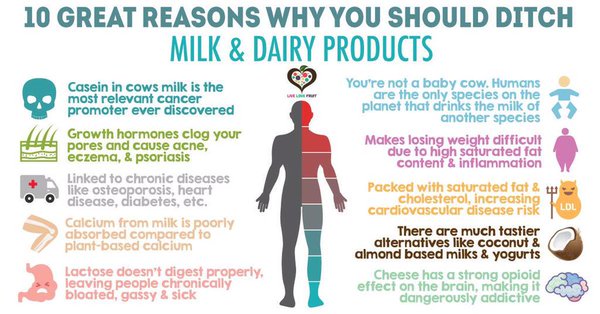
Ask anyone you see on the street if they drink milk on a regular basis and you’re bound to get a positive response. Ask them why they drink it and you’re bound to get answers such as “It’s good for my bones,” or “Where else can I obtain my calcium from?” It’s easy to assume that cow milk is safe for consumption with everyone and almost everything having dairy as a part of its ingredients. If the television says that drinking 2 glasses of milk for kids every day will build strong bones, then it has to be right! But that could not be far from the truth. Today, we’re going to take a scientific look at cow milk and why it may not be as good as everyone thinks it is!
Pros of Milk
Before we get into the cons of milk, let us take a look at some of the common reasons why we consume milk. Milk in itself contains one of the highest percentages of protein, making it easy for the busy working class to get their protein intake daily. Besides that, the abundance of vitamins and minerals that can be found in milk provides children with a full spectrum of health benefits without extra supplementation. All of the above is important in order to have a well-balanced diet and are easily available in a carton of milk so what’s stopping us from consuming more of milk then?

Cons of Milk
Milk contains something called “lactose” which is found in milk and other dairy products. Now lactose requires a particular enzyme called lactase in order to break down properly and if it doesn’t, we run the risk of developing problems such as bloating, flatulence, diarrhoea, and nausea. Now you may think that since everyone drinks milk, and no one seems to be complaining, then there definitely isn’t a problem. But that is far from the truth! A recent statistic claims that globally, up to 70% of the human population does not continue to produce lactase after finishing formula or breast feeding! It could be said that the most crucial time for humans to consume milk would be when we are babies and not after we have grown up.
Besides that, there are a few studies out there that disprove of milk building strong bones in a population and have even linked it to countries with a high rate of patients having osteoporosis. There too are studies that link consumption of milk to increased cancer risk but take the studies with a pinch of salt.
So how do you really know if you are lactose intolerant? The advisable method would be to visit your general practitioner and request for a lactose breath test. However, if you experience any abnormal bloating or diarrhea after consuming a normal serving of milk, then perhaps you are lactose intolerant.
The bottom line is this: If you find yourself being lactose intolerant to any extent, it may not be in your best interest to consume a whole lot of dairy products. If you’re unable to abstain from dairy in the long term, perhaps limiting yourself daily and getting your nutrients from other sources would be a better option for your health and well-being!